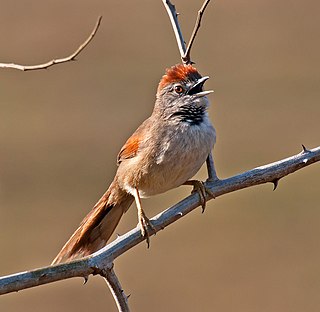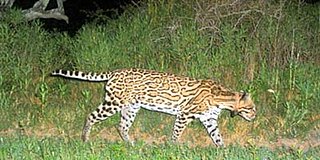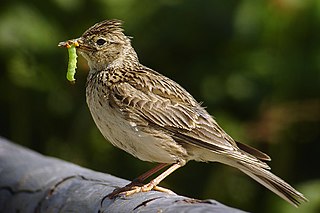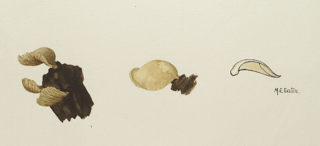
The pale-breasted spinetail, is a passerine bird which breeds in the tropical New World from Costa Rica to Uruguay, and in Trinidad.

Laguna Atascosa National Wildlife Refuge is the largest protected area of natural habitat left in the Lower Rio Grande Valley. The 98,000-acre (400 km2) refuge is located almost entirely in Cameron County, Texas, although a very small part of its northernmost point extends into southern Willacy County.

Alauda is a genus of larks found across much of Europe, Asia and in the mountains of north Africa, and one of the species endemic to the islet of Raso in the Cape Verde Islands. Further, at least two additional species are known from the fossil record. The current genus name is from Latin alauda, "lark". Pliny the Elder thought the word was originally of Celtic origin.

The silver-tipped myotis is a species of mouse-eared bat found in a range of lowland habitats in the Americas.
Monographella albescens is a fungal plant pathogen also known as leaf scald which infects rice.

The Karoo lark should not be confused with the similarly named Karoo long-billed lark.
The white suckerfish or mantasucker is a species of remora in the family Echeneidae, a group of elongated marine fish with adhesive discs for attaching to larger organisms. The distribution of this species is worldwide in warm open seas: it is found in the western Indian Ocean including Réunion and Mauritius, in the eastern Pacific Ocean from San Francisco to Chile, and in the western and eastern central Atlantic Ocean from Florida and the Gulf of Mexico to Brazil and St. Paul's Rocks.

Griseargiolestes albescens is a species of Australian damselfly in the family Megapodagrionidae. It is commonly known as a coastal flatwing.

Nassarius albescens, common name : the whitish nassa, is a species of sea snail, a marine gastropod mollusc in the family Nassariidae, the Nassa mud snails or dog whelks.
Aglossosia albescens is a moth of the subfamily Arctiinae. It is found in Nigeria and Sierra Leone.

Pterotaea albescens is a moth of the family Geometridae. It is found in California and Oregon.
Eilema albescens is a moth of the subfamily Arctiinae first described by Per Olof Christopher Aurivillius in 1910. It is found in Tanzania and Uganda.

Pterolophia is a genus of longhorn beetles of the subfamily Lamiinae, containing the following species:
Kloss's squirrel or Kloss squirrel is a species of rodent in the family Sciuridae. It is endemic to northern Sumatra in Indonesia. Population data is insufficient to assess its conservation status according to the IUCN. It is sometimes considered a subspecies of C. notatus.
Pterolophia instabilis is a species of beetle in the family Cerambycidae. It was described by Per Olof Christopher Aurivillius in 1922. It is known from Seychelles.
Pterolophia guineensis is a species of beetle in the family Cerambycidae. It was described by James Thomson in 1864, originally under the genus Alyattes.

Trimerotropis albescens, or Mcneill's white grasshopper, is a species of band-winged grasshopper in the family Acrididae. It is found in Central America and North America.

Helix albescens is a species of air-breathing land snail belonging to the family Helicidae. It is often found in Southeastern Europe and the surrounding areas. It is commonly known as the white-lipped snail or the whitish snail due to its distinctive white lip.

Crepidotus albescens is a species of saprophytic fungus in the family Crepidotaceae with a stipeless sessile cap.











